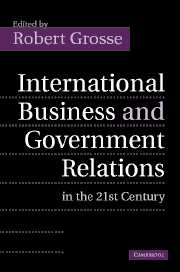Book contents
- Frontmatter
- Contents
- List of figures
- List of tables
- List of contributors
- Acknowledgments
- Introduction
- Part I History and theories of analysis of international business–government relations
- Part II The shifting international business–government partnership
- Part III Bargaining theory and the obsolescing bargain
- Part IV Host and home government views of international business
- 14 Global regulatory convergence: the case of intellectual property rights
- 15 Regional multinationals and government policy: the end of global strategy and multilateralism
- 16 How will third world countries welcome foreign direct investment in the twenty-first century?
- 17 Assessing government policies for business competitiveness in emerging market economies: an institutional approach
- 18 Protecting foreign investors in the developing world: a shift in US policy in the 1990s?
- Conclusions
- References
- Select bibliography of J. N. Behrman's works
- Index
18 - Protecting foreign investors in the developing world: a shift in US policy in the 1990s?
Published online by Cambridge University Press: 22 September 2009
- Frontmatter
- Contents
- List of figures
- List of tables
- List of contributors
- Acknowledgments
- Introduction
- Part I History and theories of analysis of international business–government relations
- Part II The shifting international business–government partnership
- Part III Bargaining theory and the obsolescing bargain
- Part IV Host and home government views of international business
- 14 Global regulatory convergence: the case of intellectual property rights
- 15 Regional multinationals and government policy: the end of global strategy and multilateralism
- 16 How will third world countries welcome foreign direct investment in the twenty-first century?
- 17 Assessing government policies for business competitiveness in emerging market economies: an institutional approach
- 18 Protecting foreign investors in the developing world: a shift in US policy in the 1990s?
- Conclusions
- References
- Select bibliography of J. N. Behrman's works
- Index
Summary
Over the years, US investors in developing countries have frequently faced demands from host governments that they renegotiate the deals under which they made their original investment decisions. In some cases, the demands have amounted simply to expropriation. Few developing countries offer much security to foreign investors. Since sovereign governments can easily break promises, it is difficult for them to make commitments that investors find credible. The history of broken promises makes investors wary of new commitments. The blatant expropriations that were characteristic of the 1960s and early 1970s may have passed, but today's fights over electricity projects, water systems, and telecommunications in the developing world show that investors' property rights are still quite insecure. Outright takings may have evolved into what investors call “creeping expropriation,” but whatever the mechanism, the original promises given investors when they enter a country have often fallen by the wayside.
Facing uncertain property rights systems in developing countries, US multinationals have turned to their home government for support to counter threats by developing countries. At times help has been forthcoming. At other times, a few comforting words from the US government have been backed by little action. Responses have not been random.
The early 1990s witnessed a substantial shift in what the US government was willing to do to support and protect its investors in the developing countries. The extent of the change has hardly been noted in the literature on international business.
- Type
- Chapter
- Information
- Publisher: Cambridge University PressPrint publication year: 2005
- 1
- Cited by



